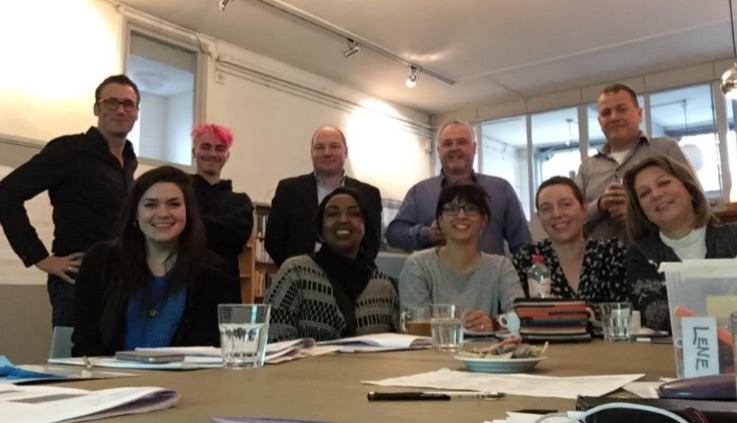En décembre dernier, à Gouda (Pays-Bas), M. Santiago, gestionnaire du lycée Nadar, et M. Gelbart, professeur d’anglais, ont partagé leur expérience de gestion des conflits avec d’autres Européens (enseignants et travailleurs sociaux) grâce au programme Erasmus+.

« Le but de cette rencontre n’était pas de nous apprendre à gérer les conflits – entre jeunes, enseignants et élèves ou encore entre collègues ou avec sa hiérarchie, etc. mais bien de partager ses expériences pour éventuellement en tirer le meilleur car certaines pratiques peuvent être transposées, malgré les différences culturelles, comme la recherche de dialogue », explique M. Santiago, gestionnaire-comptable du lycée Nadar qui a participé à une session du programme Erasmus+ ‘‘Partager l’expérience’’, du 4 au 8 décembre dernier à Gouda (Pays-Bas), avec M. Gelbart, professeur d’anglais. « C’était très enrichissant d’échanger sur nos pratiques réciproques en la matière , notamment avec les enseignantes allemandes qui travaillent elles aussi dans un lycée professionnel. D’une manière générale, nous avons pu constater que, quel que soit le pays représenté, le constat est le même. Les tensions, les incivilités, la perte de repères, le manque de respect envers l’autorité constituent un phénomène qui s’accentue et qui peut être mis en parallèle avec la montée croissante de l’insécurité sociale et économique vécue notamment pour les élèves issus de l’immigration », poursuit ce dernier, qui regrette cependant que des solutions adaptées aux besoins n’aient pas été proposées par rapport aux cas concrets exposés. Une suite pourtant est offerte aux participants de cette session avec la possibilité de s’immerger pendant deux jours dans un établissement de leur choix dans un pays de l’UE. « J’aimerais découvrir le fonctionnement d’un lycée en Suède, qui est un pays ‘‘modèle’’ au niveau scolaire », confie M. Santiago. La gestion des conflits constitue sans aucun doute un enjeu crucial aujourd’hui pour les enseignants.
Interview video de l’équipe de Nadar en stage à Gouda
En anglais
« My training in Gouda »
by Gérard Gelbart, Nadar english teacher
« I’ve been attending training on Conflict Management in Gouda in December 2017 thanks to an Erasmus plan to enable professionals to share their experience with other Europeans.
The greeting was warm and relaxed in a local pub on the Monday late afternoon to allow everybody to reach the destination. There we met the group we were going to work with for the rest of the week.
Our guest explained what was broadly the goal and contents of the following days and how he intended to process.
We had had some very serious readings to achieve before coming but it was too late for people to cancel even if they thought their level in understanding English or even sharing a conversation on this type of a topic was far too low to join such a group.
As an English teacher I was really thrilled to be able to share with others on such an interesting subject above any “C” or “B” English level I was dealing with among the students I generally teach.
The very first morning was well over my expectations because I had feared it would be too theoretical or going back to what I already knew for ages. I really felt like breathing on the top of a mountain all that fresh air that was now available but that I had no opportunity to experiment ever since my university studies back in the old days of the former century…
Here I was sharing with a young pink haired English Social Worker my teaching experiences, how it was going on in my country and learning what was really happening across the Chanel.
The two German teachers in a vocational school were also sharing the same difficulties we find among our students concerning the lack of interest, respect for any kind of authority or even their own colleagues within the classroom, the macho mentality of some of our boys who have great difficulties because of their cultural background in accepting to be thought or even spoken to by any female.
As social workers the Greek solicitor, the three British and the Belge participants also shared their experience dealing with kids who had great difficulties in finding money to feed themselves every day, manage their younger sisters and brothers or getting their school homework done only if they could still have the energy after their job besides school without mentioning in details how mothers or fathers come to us with despair knowing that they have lost any grip on their child and that in that field they can only rely on what we could eventually achieve through our class to help them face life in the working world.
The same scheme seems to work around the world or at least Europe struggling to get our students to learn and get ready for what they will have to deal with as grownups but without knowing all of this terrifying background most of the time.
To make it short, I enjoyed this training because it taught me a lot on what’s happening elsewhere in Europe even though more similarities than differences seem to be linked to the type of students we have in the suburb of a megapole vocational High School like ours. »
